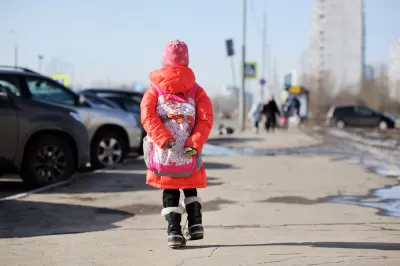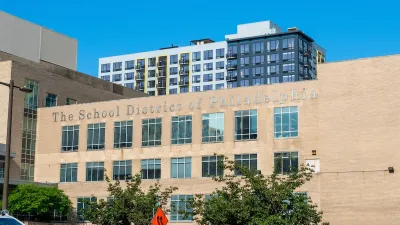A city that fosters the mental and physical health of children is safer for everyone. Six key planning and design considerations promote the well-being of the city's youngest residents.

We can use urban planning and design to better protect children. "It’s estimated that up to 500 children die daily in road crashes around the world; thousands more incur injuries and psychological trauma from collisions with vehicles that can affect them for years," write Nikita Luke, Rohit Tak, Ariadne Samios, and Claudia Adriazola-Steil.
Their article offers six ways cities can change the lives of kids for the better—ideas that go beyond adding playgrounds and aims to consider children's needs in decisionmaking processes regarding public policy.
The six improvements identified by the authors promote enhanced mental and physical health in young people: increase accessible green space, ensure safe pedestrian infrastructure, implement low-speed zones, include car-free streets, consider size, and create clean air zones.
But the benefits experienced by children would also be felt by adults. The article quotes Mayor Enrique Peñalosa of Bogotá in describing children as "a kind of indicator species." If urban planners and designers are able to build a city that promotes success for kids, everyone will experience success in cities.
"As cities and national governments reset after the coronavirus and ponder investments that will hasten a return to economic and social vibrance, incorporating the unique perspectives of children can help create more inclusive, healthier, livable cities. It’s time for cities to start thinking proactively and long-term about how best to serve all residents, including their youngest" write the authors.
FULL STORY: What Makes a Child-Friendly City? Redesigning Safer and Healthier Urban Spaces for Young People

Maui's Vacation Rental Debate Turns Ugly
Verbal attacks, misinformation campaigns and fistfights plague a high-stakes debate to convert thousands of vacation rentals into long-term housing.

Planetizen Federal Action Tracker
A weekly monitor of how Trump’s orders and actions are impacting planners and planning in America.

In Urban Planning, AI Prompting Could be the New Design Thinking
Creativity has long been key to great urban design. What if we see AI as our new creative partner?

Chicago’s Ghost Rails
Just beneath the surface of the modern city lie the remnants of its expansive early 20th-century streetcar system.

Baker Creek Pavilion: Blending Nature and Architecture in Knoxville
Knoxville’s urban wilderness planning initiative unveils the "Baker Creek Pavilion" to increase the city's access to green spaces.

Pedestrian Deaths Drop, Remain Twice as High as in 2009
Fatalities declined by 4 percent in 2024, but the U.S. is still nowhere close to ‘Vision Zero.’
Urban Design for Planners 1: Software Tools
This six-course series explores essential urban design concepts using open source software and equips planners with the tools they need to participate fully in the urban design process.
Planning for Universal Design
Learn the tools for implementing Universal Design in planning regulations.
planning NEXT
Appalachian Highlands Housing Partners
Mpact (founded as Rail~Volution)
City of Camden Redevelopment Agency
City of Astoria
City of Portland
City of Laramie





























